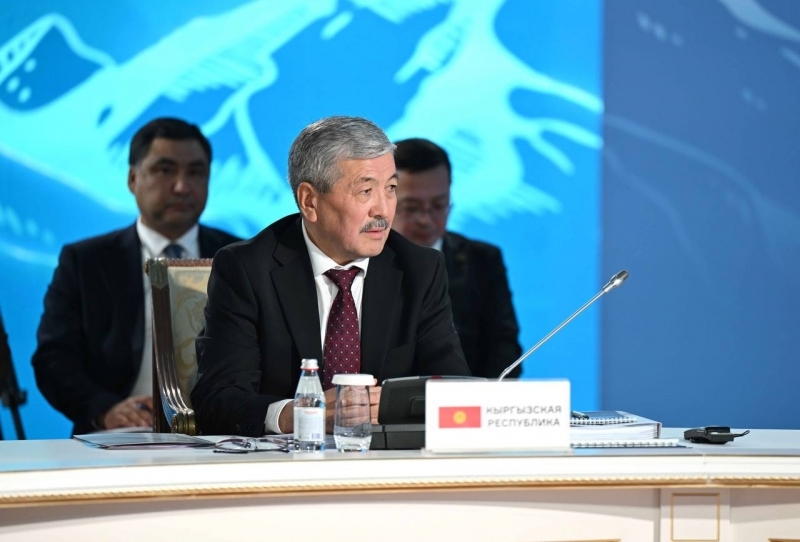Building the future: Central Asia’s push for AI development
Local
−
03 February 2025 5851 7 minutes
Central Asian nations are placing artificial intelligence (AI) at the forefront of state policy, signaling its strategic importance for regional development. According to "News Central Asia", each country has set distinct priorities and objectives, but all are working toward a common goal—advancing AI infrastructure, training specialists, and fostering innovation.
Kazakhstan, Uzbekistan, Kyrgyzstan, Tajikistan, and Turkmenistan are actively investing in AI-driven initiatives. Their efforts include building research hubs, improving educational programs, and creating favorable conditions for startups. Among these initiatives, Kazakhstan is taking a leading role with the establishment of an international AI center.
Kazakhstan to launch Alem.ai — A regional AI hub
Kazakhstan is set to open an international artificial intelligence center, "Alem.ai", in Astana this year. Prime Minister Olzhas Bektenov announced the initiative at the "Digital Almaty 2025" forum, emphasizing its role in shaping the country's technological future.

The center will bring together leading IT firms, research institutions, startups, and educational programs on a single platform. It aims to develop AI solutions, attract investments, and support emerging technology companies. According to the Ministry of Digital Development, Innovation, and Aerospace Industry, *Alem.ai* will help establish a robust AI ecosystem to drive Kazakhstan’s digital transformation.
By 2029, the initiative is expected to boost Kazakhstan’s AI exports to $5 billion and position Astana as a key AI hub in Central Asia. The project plans to attract approximately 10,000 professionals across various fields annually, train at least 1,000 AI specialists, and support the launch of 100 AI startups. Additionally, it will facilitate around 10 AI-focused research projects.
Kazakhstan’s AI sector is already gaining traction, with several homegrown startups reaching valuations of $100 million. As the region embraces AI, these investments are expected to fuel a new wave of technological and economic growth across Central Asia.
Kyrgyzstan proposes regional AI center to boost cooperation
Kyrgyzstan is advancing its artificial intelligence (AI) integration both nationally and within the Eurasian Economic Union (EAEU). At the "Digital Almaty 2025" international forum, Odilbek Kassimaliev, Chairman of the Cabinet of Ministers and Head of the Presidential Administration, announced the country's proposal to establish a Regional Center for Artificial Intelligence. The initiative aims to strengthen AI collaboration among EAEU member states.
According to Kassimaliev, the successful digital transformation of EAEU countries requires a focus on key areas such as enhancing digital skills, supporting startups and innovation, and strengthening cybersecurity. To facilitate these efforts, Kyrgyzstan has proposed the creation of a unified body to oversee regional AI projects and coordinate strategic initiatives.

In parallel with its regional ambitions, Kyrgyzstan is taking significant steps to develop its national AI ecosystem. The country has established a National Council on Artificial Intelligence and is in the process of approving a national AI strategy. This strategy prioritizes the development of domestic AI-driven solutions and promotes cross-sectoral collaboration to integrate AI across key industries.
Kyrgyzstan's proactive approach reflects a broader trend in Central Asia, where nations are increasingly investing in AI to drive economic growth and technological advancement.
Tajikistan pilots AI lessons in schools
Tajikistan is taking a significant step toward integrating artificial intelligence (AI) into its education system with the launch of the AI-STUDY pilot initiative. The program, which initially introduced AI lessons in five schools, has expanded due to strong interest from students and educators.
The first participating institutions include Dushanbe International School, Kontofield International School, Navoi School, Kafolat Gymnasium, and Hotam & PV Tajik-Russian Boarding Lyceum. Several private schools have since joined the initiative, with each participating school hosting 15–20 students in dedicated AI study groups.
To ensure high-quality instruction, teachers underwent specialized training in AI pedagogy before introducing the curriculum. The training emphasized the real-world applications of AI across various industries, including healthcare, education, and business.
The curriculum combines theoretical learning with hands-on experience. After completing the introductory coursework, students will develop independent AI projects, enhancing their critical thinking skills and understanding of how emerging technologies can benefit society.
This initiative aligns with Tajikistan’s national AI development strategy, which aims for advanced technologies to contribute up to 5% of the country’s GDP by 2040. By introducing AI at an early stage, Tajikistan is preparing a new generation for the challenges and opportunities of the digital economy.
Turkmenistan takes initial steps toward AI integration
Turkmenistan is making strides in adopting artificial intelligence (AI) across key sectors, including education, energy, and public administration. A series of strategic initiatives are laying the groundwork for AI-driven transformation in the country.
A recent digital transformation seminar at the Academy of Public Administration under the President of Turkmenistan introduced government officials to modern AI tools. The training focused on e-governance and civil society development, highlighting AI’s role in enhancing public services and administrative efficiency.
The Ministry of Education of Turkmenistan has expressed interest in integrating AI-driven learning technologies. It is currently exploring Huawei’s ULearning Smartclass system, which uses AI to assess teaching effectiveness, develop educational content, and analyze academic performance. A pilot program will soon allow 200 users to test the system.
AI is also being applied in oil and gas exploration. Dragon Oil (UAE), a partner of Turkmenistan’s Oil State Concern, has successfully implemented 3D seismic technology and AI-driven geological analysis to improve resource exploration and extraction in Cheleken and Block 19, according to CEO Ali Rashid Al Jarwan.
Turkmenistan is also investing in homegrown digital solutions, Recent initiatives include an e-school platform, a university rating system, and an information system for higher education. These projects reflect the country’s commitment to AI-driven modernization and digital transformation across various industries.
As Turkmenistan continues to explore AI applications, these early steps signal a growing focus on technological innovation and economic modernization.
Uzbekistan advances AI strategy with over 20 implemented projects
Uzbekistan is accelerating its artificial intelligence (AI) development, with more than 20 AI-powered projects already implemented across various sectors. The country has adopted an AI Development Strategy extending until 2030, aiming to position itself among the world’s top 50 countries in government AI readiness.
Under this strategy, Uzbekistan plans to invest $1.5 billion in AI-driven software and services. The initiative includes the establishment of 10 specialized research laboratories focused on AI and the development of high-performance server infrastructure for big data processing.
A key component of Uzbekistan’s AI strategy is workforce development. In partnership with the UAE, the country has launched an ambitious program to train 1 million AI programmers. This large-scale initiative aims to build a strong talent pipeline to support the country’s AI-driven transformation.
Uzbekistan has already introduced AI solutions across public services and financial technology. Notable projects include:
- PalmPay – an AI-powered metro payment system
- MyID & FaceID – digital identification features in mobile applications
- E-Government Portal – streamlining public services with AI
- Tax Committee AI Assistants – enhancing efficiency in tax administration
- LexAI – an AI-powered legal platform
To further boost AI-driven entrepreneurship, Uzbekistan is launching new support systems for innovative AI projects starting in 2025. Acceleration programs and venture investment initiatives will provide funding and resources for AI startups, fostering a dynamic tech ecosystem.
With strong government backing and international cooperation, Uzbekistan is emerging as a regional leader in AI adoption, paving the way for technological and economic transformation.
Live
All




